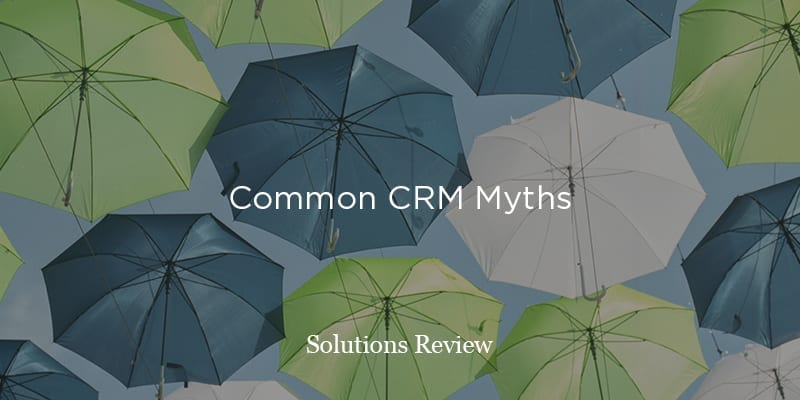The Top 5 Most Common Myths About Using CRM


CRM, also known as Customer Relationship Management, helps organizations increase productivity and streamline processes across departments where customer interaction is key. It was once an entirely sales-focused technology, but in the past decade has seen increasing use in other verticals such as customer service and marketing. Yet even as years pass and technology evolves, CRM continues to be misunderstood as a complex, difficult-to-use enterprise technology. Businesses of all shapes and sizes use CRM, but there are several myths regarding this technology.
These misconceptions, or myths, are rooted in issues of the past. CRM first came into its own when large, enterprise-level companies implemented company-wide changes. It took time for employees to learn how to use the software, and it wasn’t necessarily a cakewalk. In this article, we will debunk five of some of the most common myths about CRM.
All CRM Solutions Are Expensive
Sometimes people tend to have misconceptions about the price of enterprise software. Because it’s used by large enterprises, by companies across the world, it has to be expensive. But this isn’t necessarily true. Yes, you can spend a lot of money on big name vendors. They have often have feature-rich solution portfolios, and it’s easy to rack up a large bill if you decide to implement a variety of solutions at the same time. But if you’re looking to save some money, don’t worry. There’s still a plethora of options available to you; whether you’re on a tight budget or you need a completely free CRM solution, you can find something that meets your organization’s needs.
One thing to note is that the affordable tools offered by CRM solution providers are often just parts or pieces of their flagship products. For example, the freemium version may include data storage limits and restrict the number of users who can access the solution, while a paid option will unlock several of those features. Nevertheless, depending on your budget, affordable tools can still be a great way to expand your business capabilities without breaking the bank.
It’s Too Difficult to Use CRM
In the past, employees needed extensive training and a large amount of time to learn how to use a new CRM system. That took time and resources away from important work that needed to get done. But today, modern CRM platforms are designed to be easy to use. Now more than ever, there’s an increased focus on developing user-friendly interfaces. More effort is placed on making the product sleek and approachable so that employees can quickly get back to work after implementation.
That being said, there’s always going to be a learning curve when it comes to interacting with new software and tools. Modern CRM developed has severely shortened that curve, but business leaders should still give their employees time to get used to their new work environment. Many vendors provide a variety of on-boarding resources, including online guides, customer service, or even sending an employee to your company campus to make sure that the transition is going smoothly.
CRM Is Only For Large, Sprawling Enterprises
One of the biggest myths out there is that only large corporations need CRM solutions, as they have to balance a large number of clients and sales information. While it’s true that you’ll have a hard time finding a well known brand that doesn’t use CRM, that doesn’t mean that small businesses shouldn’t be using it as well. Any business that directly interacts with customers will greatly benefit from CRM. CRM allows you to better sell and communicate with your customers, as well as centralize and organize your data.
Additionally, many CRM solutions marketed towards smaller businesses come with a variety of other features, such as marketing automation and customer service capabilities. Software vendors know that smaller businesses don’t have as much spending freedom as larger businesses, and have in turn created all-in-one solutions to address this challenge.
Only Sales Teams Use CRM
While CRM is most commonly associated with sales, it is not sales-exclusive software. Today’s CRM solutions offer a variety of features and capabilities, including marketing automation, customer service, e-commerce, and more. Giving your employees access to such tools and information can only add more value to your business, and encourages a more comprehensive and holistic approach to your business.
Every team in your company has a function, and every time in your company needs to be there. Sales can’t sell to customers if marketing doesn’t attract customers in the first place. Customer service can’t help customers if sales doesn’t close on any deals. CRM has much broader applications than it’s ever had before, and your employees will do better when they understand where their data is coming from. When different teams are connected with each other, it empowers employees to build deeper relationships with their customers and their coworkers.
CRM Is Just Time-Consuming Data Entry
Manually entering customer contact information can be a pain, especially if you’re dealing with lists of thousands of people. You want to make the most of your time, instead of wasting it on repetitive but necessary input. Luckily for you, modern CRM solutions have a variety of automation capabilities such as automatically capturing and updating customer information, generating sales reports and insights, and much more.
Depending on additional software integrations, particularly marketing automation, you’ll spend much less time on data entry than you might expect. In the past, manually entering information was a lengthy but necessary part of the job. Modern CRM vendors have quickly addressed this problem, and more automation features will most likely enter the marketspace as technology continues to evolve.





















